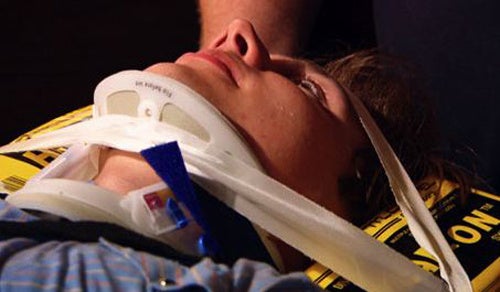This article was linked from something I posted in then Mtv challenge thread. It's kind of old but it explains a lot as far as why things never really added up. This is just contracts about the real world, I'm sure other shows have air tight contacts just like these.
Real World Contracts Stipulate That You Could Die And MTV's Not To Blame
8/02/11 5:10pm

The Village Voice obtained a copy of MTV's standard contract for The Real World, a 30-page document that essentially requires cast members to sign their lives away, quite literally—the first stipulation being the understanding that participating in this reality show could cause death, loss of limbs, or mental illness. Hundreds of cast members have agreed to these terms in the past 25 seasons of the show.

While some of the terms in the contract may seem outlandish, they're there for good reason. Because one time a guy did almost die. In 2010, during the D.C. season, cast member Andrew Woods was pushed off a two-story balcony by one of his drunk roommates, landing on a concrete slab.

The Real World: Drunk Guy Throws Other Drunk Guy Off Two-Story Balcony
The Real World: D.C. has been kind of boring to the point of being unwatchable (which is saying a… Read more
And there are many more examples of "mental illness" or "extreme emotional distress" in the form of nervous breakdowns. During the 2006/2007 season of Denver, Brooke LaBarbera became a staple of on The Soupfor her numerous meltdowns caused by the stress of her living conditions.
This also ties into another contract stipulation:
[Portrayal of cast members] may be disparaging, defamatory, embarrassing, [causing exposure to] public ridicule, humiliation or condemnation…[Cast members] may be portrayed in a false light.
While also signing off on any objections to "a serious invasion of privacy," Cara Kahn, part of 2002's Chicago cast, learned exactly what this meant the hard way, after watching herself have sex with several different men on television. It was the first time that Real World producers had used night vision cameras in the bedrooms and hidden microphones in the headboards of the beds, enabling them to pick up the audio of Cara opening a condom wrapper. The cast were unaware of this new development in production until the show aired, and Kahn later admitted to being humiliated by her portrayal as a "slut."

As for being portrayed in a "false light," in 1998, Irene McGee, part of the Seattle cast, left the show and her departure was depicted as having to do with a relapse of her Lyme Disease, but footage of McGee was also edited to make it appear that she was losing her mind. After the show aired, McGee spoke out that she'd really left the show for "ethical objections to the production," and went on to give lectures about the falseness of reality TV, speaking out against The Real World and divulging industry secrets. She was sued by MTV.
McGee's legal dealings with MTV and her telling tales out of school no doubt contributed to another contract stipulation that requires cast members to participate in all producer-determined press and are required to abstain from engaging in any other media (radio, TV, blogs, chat rooms, message boards) without the producers' written permission. Additionally, if cast members are found to have violated any of the stipulations of the contract, they are required to pay producers $1 million.
Given the impact that AIDS activist Pedro Zamora had during the 1994 season in San Francisco, it's interesting that cast members are no longer allowed to participate in the show if they have any STDs and are required to sign a statement saying they don't. However, the contract also states that the other roommates might have STDs and that MTV is not responsible if you contract anything like AIDS "gonorrhea, herpes, syphilis, pelvic inflammatory disease (PID), Chlamydia, scabies (crabs), hepatitis, genital warts, and other communicable and sexually transmitted diseases or Pregnancy; etc." from a roommate while living in the house. (In 2004, during the Philadelphia season, Melanie Silcott contracted scabies while living in the house.)

If you were wondering why nobody on The Real Worldhas dealt with an unwanted pregnancy since Tami in the 1993 Los Angeles season—particularly considering MTV's boner for young moms and teen pregnancy—it's because cast members are not allowed to be pregnant. Pregnancy is grounds for dismissal.
Safety in The Real World house is also not a guarantee. Aside from the dangers of dying or contracting AIDS, the producers are under no obligation to conduct background checks on any of the roommates—meaning a participant could live with a violent criminal—and cast members are required to understand that they might have to deal with "non-consensual physical contact, of which MTV is not responsible. So basically, if you are raped or murdered by a fellow cast member, it's really on you.
During the filming of the 2004 season of San Diego, a 22-year-old woman claimed she was raped in the house, by a guest of one of the roommates, after being roofied. Apparently, the production staff found the woman lying naked on the bathroom floor. One cast member said she heard the accused rapist of walking out of the bathroom saying, "I just hit that." The cameras were rolling when the woman woke up, and one of the female roommates in the house informed her that she may have been sexually assaulted. The woman went to the police the next day, who began an investigation. However, the cast and crew had already left for Mexico, where they were filming their "vacation." A producer of the show did allow police into the home for a search, and provided them with the consent forms and IDs of guests in the house.
A lawyer for Bunim/Murray stepped in and refused to let the cops search the bedrooms. The police, most likely pissed off, returned with a search warrant and seized all bedding, editing equipment, and tapes from the time of the alleged crime. The result was that nearly a month of footage ended up on the cutting room floor because it wasn't returned in time, including the cast's Mexican vacation footage. No arrests were ever made in that case.
Some other contract stipulations worth noting:
 man fukk all that instant reality tv fame. I have way too much dignity willingly sign on for this kind of shyt.
man fukk all that instant reality tv fame. I have way too much dignity willingly sign on for this kind of shyt.
Real World Contracts Stipulate That You Could Die And MTV's Not To Blame
8/02/11 5:10pm

The Village Voice obtained a copy of MTV's standard contract for The Real World, a 30-page document that essentially requires cast members to sign their lives away, quite literally—the first stipulation being the understanding that participating in this reality show could cause death, loss of limbs, or mental illness. Hundreds of cast members have agreed to these terms in the past 25 seasons of the show.

While some of the terms in the contract may seem outlandish, they're there for good reason. Because one time a guy did almost die. In 2010, during the D.C. season, cast member Andrew Woods was pushed off a two-story balcony by one of his drunk roommates, landing on a concrete slab.

The Real World: Drunk Guy Throws Other Drunk Guy Off Two-Story Balcony
The Real World: D.C. has been kind of boring to the point of being unwatchable (which is saying a… Read more
And there are many more examples of "mental illness" or "extreme emotional distress" in the form of nervous breakdowns. During the 2006/2007 season of Denver, Brooke LaBarbera became a staple of on The Soupfor her numerous meltdowns caused by the stress of her living conditions.
This also ties into another contract stipulation:
[Portrayal of cast members] may be disparaging, defamatory, embarrassing, [causing exposure to] public ridicule, humiliation or condemnation…[Cast members] may be portrayed in a false light.
While also signing off on any objections to "a serious invasion of privacy," Cara Kahn, part of 2002's Chicago cast, learned exactly what this meant the hard way, after watching herself have sex with several different men on television. It was the first time that Real World producers had used night vision cameras in the bedrooms and hidden microphones in the headboards of the beds, enabling them to pick up the audio of Cara opening a condom wrapper. The cast were unaware of this new development in production until the show aired, and Kahn later admitted to being humiliated by her portrayal as a "slut."

As for being portrayed in a "false light," in 1998, Irene McGee, part of the Seattle cast, left the show and her departure was depicted as having to do with a relapse of her Lyme Disease, but footage of McGee was also edited to make it appear that she was losing her mind. After the show aired, McGee spoke out that she'd really left the show for "ethical objections to the production," and went on to give lectures about the falseness of reality TV, speaking out against The Real World and divulging industry secrets. She was sued by MTV.
McGee's legal dealings with MTV and her telling tales out of school no doubt contributed to another contract stipulation that requires cast members to participate in all producer-determined press and are required to abstain from engaging in any other media (radio, TV, blogs, chat rooms, message boards) without the producers' written permission. Additionally, if cast members are found to have violated any of the stipulations of the contract, they are required to pay producers $1 million.
Given the impact that AIDS activist Pedro Zamora had during the 1994 season in San Francisco, it's interesting that cast members are no longer allowed to participate in the show if they have any STDs and are required to sign a statement saying they don't. However, the contract also states that the other roommates might have STDs and that MTV is not responsible if you contract anything like AIDS "gonorrhea, herpes, syphilis, pelvic inflammatory disease (PID), Chlamydia, scabies (crabs), hepatitis, genital warts, and other communicable and sexually transmitted diseases or Pregnancy; etc." from a roommate while living in the house. (In 2004, during the Philadelphia season, Melanie Silcott contracted scabies while living in the house.)

If you were wondering why nobody on The Real Worldhas dealt with an unwanted pregnancy since Tami in the 1993 Los Angeles season—particularly considering MTV's boner for young moms and teen pregnancy—it's because cast members are not allowed to be pregnant. Pregnancy is grounds for dismissal.
Safety in The Real World house is also not a guarantee. Aside from the dangers of dying or contracting AIDS, the producers are under no obligation to conduct background checks on any of the roommates—meaning a participant could live with a violent criminal—and cast members are required to understand that they might have to deal with "non-consensual physical contact, of which MTV is not responsible. So basically, if you are raped or murdered by a fellow cast member, it's really on you.
During the filming of the 2004 season of San Diego, a 22-year-old woman claimed she was raped in the house, by a guest of one of the roommates, after being roofied. Apparently, the production staff found the woman lying naked on the bathroom floor. One cast member said she heard the accused rapist of walking out of the bathroom saying, "I just hit that." The cameras were rolling when the woman woke up, and one of the female roommates in the house informed her that she may have been sexually assaulted. The woman went to the police the next day, who began an investigation. However, the cast and crew had already left for Mexico, where they were filming their "vacation." A producer of the show did allow police into the home for a search, and provided them with the consent forms and IDs of guests in the house.
A lawyer for Bunim/Murray stepped in and refused to let the cops search the bedrooms. The police, most likely pissed off, returned with a search warrant and seized all bedding, editing equipment, and tapes from the time of the alleged crime. The result was that nearly a month of footage ended up on the cutting room floor because it wasn't returned in time, including the cast's Mexican vacation footage. No arrests were ever made in that case.
Some other contract stipulations worth noting:
- You can't change your physical appearance during filming without the producers' permission. (So did Rachel need to get a note, for the 1994 San Francisco show, when she got a tattoo?)
- Producers can misrepresent cast members' life stories.
- Producers can have access to cast members' school records and credit history.
- Production can show up at cast members' personal homes at any time to film or remove any possessions from those homes as long as they return said possessions once production has ended.
- Cast members are obligated to participate in a reunion special for up to five years after the show ends. (This might stem from Aaron's and Dominic's refusal to participate in any reunion shows after they finished filming the Los Angeles season in 1993.)
- Cast members are responsible for the cost of all long-distance phone calls during filming and must reimburse producers.
 man fukk all that instant reality tv fame. I have way too much dignity willingly sign on for this kind of shyt.
man fukk all that instant reality tv fame. I have way too much dignity willingly sign on for this kind of shyt. those terms are insane. Reading through emails and checking your credit history
those terms are insane. Reading through emails and checking your credit history  .
.
 how The Miz is one of the hand few that became successful is amazing in hindsight
how The Miz is one of the hand few that became successful is amazing in hindsight